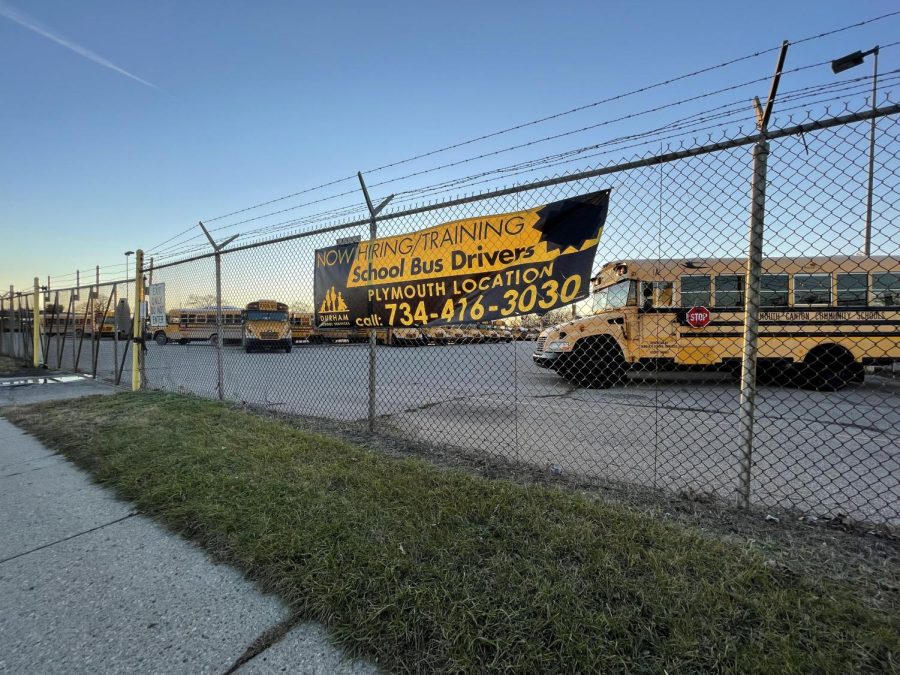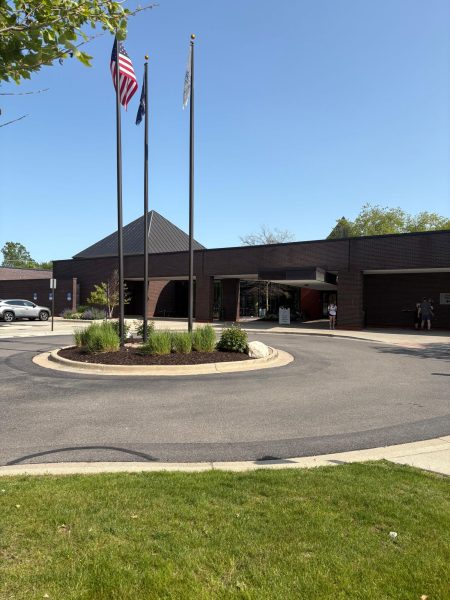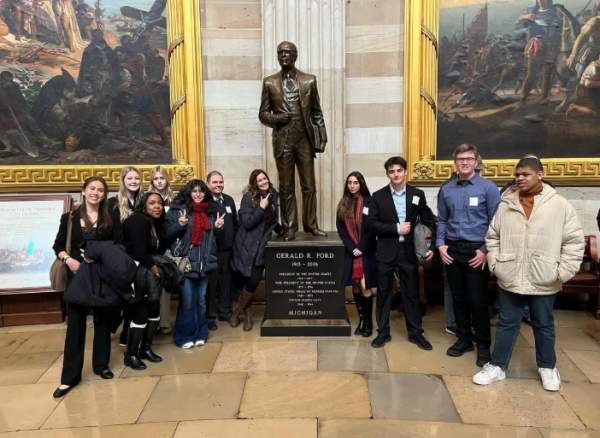Plymouth-Canton school bus driver shortage rattles transportation services
A school bus lot fence advertises hiring and training opportunities at Durham School Services in Plymouth, Michigan, amidst a lack of school bus drivers Dec. 4.
A chain-link fence encloses a swath of school buses, and the Durham School Services building is only a few steps away. A large banner attached to this fence beckons interested individuals to become school bus drivers in Plymouth, Michigan. A phone number in bright yellow is listed, and buses lined up side by side rest behind it.
Many students in the district rely on a school bus to bring them to school. Plymouth-Canton Community Schools (P-CCS) deals with a challenge this school year: acquire enough school bus drivers to cover over 100 bus routes.
Amidst a national school bus driver shortage, the P-CCS Transportation Department continues to grapple with organizing school bus routes in Northwestern Wayne County, Michigan during the 2021-2022 school year.
Since early September, P-CCS families’ students taking the school bus have experienced delays and cancellations of their bus routes. Some routes were canceled daily, coming as unwanted surprises hours before the start of the day. Others dealt with suspensions in services for weeks or even months before having an opportunity to ride again.
The P-CCS Communications Department cited the decline in school bus drivers nationwide as the primary cause. The issue has created a domino effect of negative consequences for families as they struggle to transport their children and navigate their mornings.
The findings of a survey jointly conducted by the National Association for Pupil Transportation, National School Transportation Association, and National Association of State Directors of Pupil Transportation Services (NASDPTS) released in late August 2021 with nearly 1,500 school districts and companies responding, stated, “Fifty-one percent [51%] of respondents described their driver shortage as “severe” or “desperate.’”
The survey also stated, “50% of respondents said the rate of pay is a major factor affecting their ability to recruit and retain drivers.” Forty-five percent of respondents voiced their belief that the “length of time to secure a CDL [commercial driver’s license]” factored into the school bus driver shortage.
One P-CCS administrator explained the current state of the issue, outlining the significant shift in the number of bus drivers and the routes they cover each day.
Chief Finance & Operations Officer (CFOO) Deborah Piesz, the transportation overseer for P-CCS, said Dec. 1, “There are approximately, currently, as I sit here right now, 87 school bus drivers to cover 108 routes.”
“It was 116 [routes] originally, and then we did our best to combine those down [to] as many would hold in a bus, you know, based on capacity,” Piesz said. “Therefore, we are short, today, about 21 drivers.”
She added that out of the 108 routes, 13 general education routes remained canceled Nov. 23.
According to a P-CCS Communications Department newsletter, nine general education routes were temporarily unavailable Sept. 4.
One cause of the shortage was the long training and certification process. According to Piesz, 14 bus driver trainees were working toward certification Nov. 23 but had not completed the process. She then explained how the Michigan office of Secretary of State and lengthy bus driver requirements prolonged the wait for reopening routes.
“Secretary of State only has so many appointments,” Piesz said. “You have to get an appointment, you have to pass the test, same kind of thing. So, it just takes four to six weeks to get all that done in addition to a physical exam, a drug test, fingerprinting and then you have to go through the Secretary of State items.”
Piesz stated school bus drivers need a commercial driver’s license (CDL), and she added it requires a more rigorous licensing process than for a driver’s license.
According to Piesz, the average age of a school bus driver in Michigan before the COVID-19 pandemic was 65. She outlined how age has impacted previous drivers and potential recruits.
“They have decided to either not do it [work as drivers], go to Florida for the winter or, you know, are unfortunately not with us any longer,” Piesz said. “So, now the workforce is completely changed for transportation.”
In May 2020, the U.S. Bureau of Labor Statistics indicated “school and employee bus transportation” made a median annual wage of $38,020. They reported the median annual wage of all occupations in the United States to be $41,950.
Durham School Services, a contractor of the district transportation department, saw a general manager resign this October. Other coordinators and organizers of the transportation process also have left since then.
“Since the beginning of school, they [have] replaced the office administrator, a safety and training coordinator and a special education router,” Piesz said. “So, they have had a complete turnover of staff there except for two people who have graciously worked 12 hour days to make sure we get at least some transportation services.”
Piesz believes that these route suspensions could drag into January 2022, and she outlined that this was never the intent of the P-CCS administration.
“In August, we thought we would be solved entirely by the end of September,” Piesz said.
Solutions to alleviate the effects of the cancellations have formed, such as prioritizing the reopening of longest-cut routes, said Piesz. She reiterated that the administration, along with Durham School Services, worked tirelessly to spread the word about the school bus driver vacancies.
“They thought that they could get enough drivers by now,” CFOO Piesz said. “They put ads in the paper. They did Indeed [hiring website]. They have done job fairs. They have put flyers out in the community. They have also put signage out in the community, and it is just, it is very difficult.”
Other considerations to alleviate the shortage popped up in the P-CCS Transportation Department, one being part-time job offerings for school bus drivers.
“Yes, we will take part-time,” Piesz said.
She also stated that the department accommodates schedules of new hires to fill as many school bus driver slots as possible.
After seeing an account taken in October recording school bus ridership, Piesz considered requiring students to opt-in to a bus route rather than organize them based on eligible riders. She added that this could increase route efficiency by distributing students evenly on the bus routes.
“So, we are looking at, maybe for [the] second semester, having people opt-in to the bus,” Piesz said.
P-CCS students have also seen the effects of the issue, even those who do not take the bus. One P-CEP sophomore described the situation for parents and guardians amidst the bus driver shortage.
“In the afternoon, they [parents] might have to get out of work earlier just to pick up their kid when they could have been working,” said Plymouth High School sophomore Jon Frohling, a friend of an affected student. “It could definitely influence how much money they [parents] make per year.”
According to Frohling, automobile lines at P-CEP have been longer than in previous years. He added that they only exacerbated the transportation issue, causing some students to be late for class and others to wait longer for a ride home.
One student whose bus route had been cancelled but is now restored stopped taking a school bus entirely, even when the route returned. He cited the hassle of switching back and forth as the concern that persuaded him not to take the bus.
“It could be changed back, but we just do not really want to take the chance,” said Salem High School sophomore William Foss on Zoom. “Since if it goes out again, we do not [want to] have to just immediately flip back and try to get used to that again.”
Over Zoom, Foss acknowledged the shortage of school bus drivers at P-CEP; however, he also highlighted the untimeliness of the bus cancellation notice to his family. Piesz stated these incidents occur due to illness.
“The daily cancellations are because a driver called in sick,” Piesz said. “So, we do not have any substitutes in order to pick up those routes.”
Piesz mentioned that some routes have been unavailable since early September, and she clarified that they stem from resignations, leave of absences or other incidents.
“Seven from the original first day of school are still suspended, and six [are] from either resignation, leave of absences or FMLAs [Family and Medical Leave Act leave requests],” Piesz said. “So, if you are sick, you need surgery, you have an approved FMLA, then your route is suspended until your driver comes back.”
She stated the school bus driver shortage is a national issue affecting the entire country.
“It is just not a Michigan problem. It is not just a Southeast Michigan problem,” said Piesz. “It is a problem across the United States as a whole.”
Your donation will support the student journalists of Salem High School - MI. Your contribution will allow us to purchase equipment and cover our annual website hosting costs.











